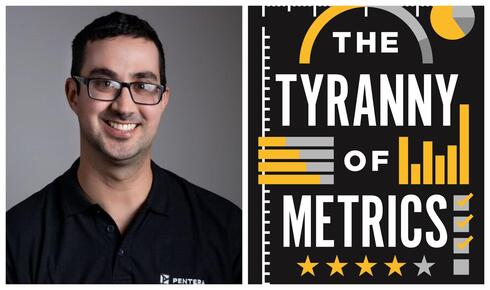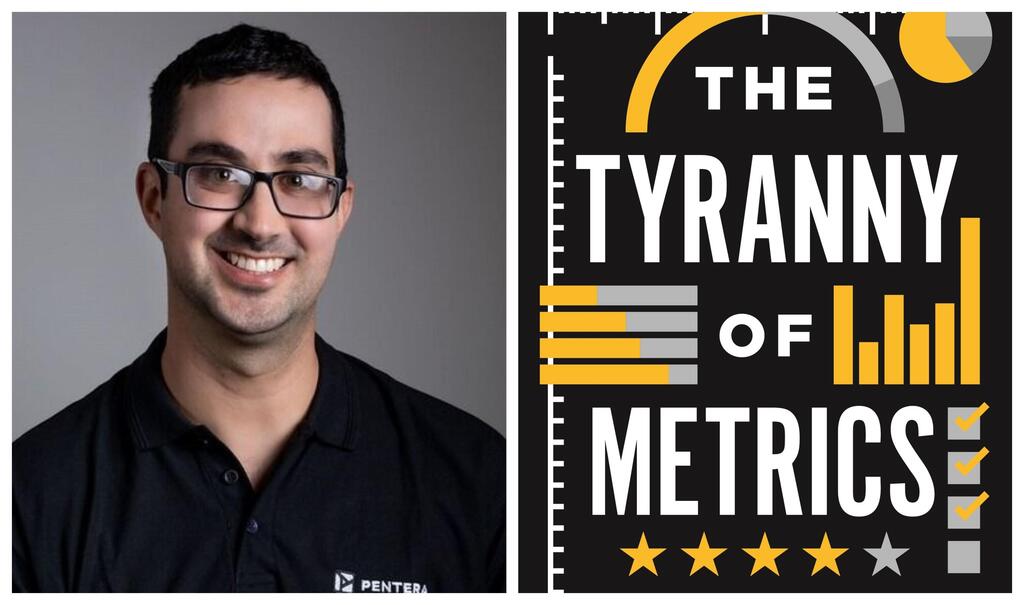
BiblioTech
CTech’s Book Review: Time to swap the overanalysis with intuition
Aron Skversky, Director of Acquisition at Pentera, has joined CTech to share a review of “The Tyranny of Metrics” by Jerry Muller.
Aron Skversky is the Director of Acquisition at Pentera, a cybersecurity software company specializing in automated security validation solutions. He has joined CTech to share a review of “The Tyranny of Metrics” by Jerry Muller.
Title: “The Tyranny of Metrics”
Author: Jerry Muller
Format: Book
Where: Home
Summary:
The central premise of ‘The Tyranny of Metrics’ critically examines our obsession with quantification. Dr. Jerry Z. Muller argues that while metrics can be useful, they are not inherently valuable, nor are they always aligned with meaningful outcomes. The book underscores that an overemphasis on measurement can divert attention from what truly matters, often favoring what is easy to quantify over what is genuinely impactful.
Muller contends that human judgment, expertise, and intuition have been sidelined in favor of data-driven approaches. Through a wealth of examples, he critiques poorly designed, outdated, and counterproductive metrics across various fields, including policing, medicine, education, the military, and business.
Muller warns that an excessive focus on metrics can stifle innovation, particularly in the business world. Innovation, by its nature, involves risk and uncertainty, with results that may only become apparent over time.
One standout quote encapsulates this challenge:
“Performance metrics as a measure of accountability help to allocate blame when things go badly, but do little to encourage success, especially when success requires imagination, innovation, and risk. Indeed, as the economist Frank Knight noted almost a century ago, entrepreneurship entails “immeasurable uncertainty,” which is not susceptible to metric calculation.” (p. 151)
In essence, ‘The Tyranny of Metrics’ advocates for using metrics as tools rather than ends themselves, urging readers to evaluate whether a particular measurement genuinely serves their goals.
Important themes:
At the heart of ‘The Tyranny of Metrics’ lies an exploration of the law of unintended consequences. Dr. Muller illustrates how systems designed with metrics as their centerpiece often yield counterproductive results—not despite their design, but because of it. Players within such systems are incentivized, and frequently rewarded, for prioritizing easily measurable outputs, even if these outputs diverge from the actual goals.
The unintended consequences Muller highlights are both pervasive and troubling:
- Police departments measured by arrest quotas may target minor, easily solved crimes, diverting resources from more impactful work.
- Educational institutions focus on student test scores at the expense of fostering genuine learning, a nuanced and non-linear process.
- Surgeons may avoid high-risk operations to protect their performance statistics.
These distortions, Muller argues, encourage "short-termism," dissuade innovation and risk-taking, diminish productivity, and can even erode personal satisfaction and fulfillment. These are the byproducts of metrics misaligned with the overarching purpose.
Muller contends that society has swung too far toward quantification, undervaluing the irreplaceable contributions of experience and intuition. To address this, he offers a pragmatic checklist for evaluating metrics. Key considerations include the complexity of what is being measured (e.g., straightforward metrics like ARR versus complex ones like brand awareness), the utility of proposed metrics, and whether metrics are necessary at all. He challenges readers to consider alternative ways of assessing success and to ask: what would happen if standardized measurement were absent?
By providing these insights, Muller equips readers with a framework to critically evaluate the role of metrics and their alignment with meaningful goals.
What I’ve learned:
For those who know me, the title of this book might seem contradictory to my persona. “Wait, Aron? A metrics tyrant himself? How could he align with the idea that metrics aren’t the ultimate path to better results?” It’s a fair question. Admittedly, this perspective shift has been a slower journey for me than for many of my peers.
A story from a decade ago illustrates my evolution:
While working at K Logic, I was managing Google Ads campaigns for clients. One of these campaigns, focused on bidding for their brand name, was underperforming. Competitors had started aggressively targeting the same keywords, driving up costs and reducing our cost-per-lead efficiency. My solution at the time? I recommended stopping the campaign entirely, effectively ceding the space to competitors. From a purely performance-metrics standpoint, this seemed rational—cutting losses and reallocating resources. But in hindsight, it was a shortsighted move, one that overlooked the intangible yet critical value of brand protection and presence in the long term.
Reading ‘The Tyranny of Metrics’ has reinforced and refined my growing belief in a more holistic approach to business strategy and results. It validated the idea that not everything of value can—or should—be quantified. Certain aspects of a business’s success, like brand strength or team creativity, are inherently complex and resistant to numerical encapsulation. This book has challenged me to think beyond spreadsheets and dashboards, embracing the nuanced and sometimes immeasurable elements that drive lasting success.
Through this lens, I’m learning to view metrics as tools, not gospel. Some things are valuable precisely because they defy quantification, and recognizing this has been a pivotal step in my professional growth.
Critiques:
Dr. Muller successfully identifies a significant and pervasive issue: the misuse and over-reliance on metrics often lead to unintended harm, undermining the very goals they aim to achieve. However, his proposed solution—relying on experience and intuition—falls short of being actionable or well-defined.
The emphasis on intuition as a counterbalance to metrics introduces its own set of challenges. Intuition, much like poorly designed metrics, can be unpredictable and subjective. While Muller’s critique of metrics is sharp and persuasive, his alternative remains nebulous, offering little in the way of practical guidance for integrating intuition into decision-making processes in a meaningful way.
From my perspective, the path to growth and innovation lies not in abandoning metrics but in maintaining a healthy skepticism toward them. Organizations must regularly challenge their assumptions about what they are measuring and why. Are the metrics still relevant? Are they aligned with the broader goals? Simultaneously, businesses must create space for uncertainty and bold, creative moves—those "big swings" that defy conventional measurement but are essential for breakthrough innovation.
Ultimately, the real takeaway is balance. Metrics can be valuable tools, but they should serve as guides rather than shackles, leaving room for the dynamic, messy, and immeasurable aspects of progress and creativity.
Who should read this book:
‘The Tyranny of Metrics’ is a must-read for CEOs, CMOs, salespeople, and marketers who need a reality check about their reliance on metrics and should consider the following questions:
- If your pipeline opportunities aren’t converting into ARR at a satisfactory rate, why is your marketing team focused solely on generating pipeline opportunities? Perhaps it’s time to redirect their efforts toward advancing existing deals and adjust their compensation structure accordingly.
- If competitors are consistently outperforming you, why isn’t a portion of your budget dedicated to combating their efforts—even if it doesn’t directly generate measurable opportunities?
- If increasing website traffic is a priority, ask yourself: Does it actually correlate with your broader objectives, or does it simply create more noise, complicating your marketing efforts?
Muller’s book invites readers to take a step back and reevaluate the role of metrics in their decision-making processes. It’s a reminder not to commit to metrics blindly. Instead, approach them cautiously—test them, scrutinize them, and ensure their relevance before fully embracing them.
As the book subtly suggests, treat metrics like a relationship. Date them first, get to know their “family,” evaluate compatibility, and only then make a commitment. Your business will thank you for it.
WATCH: Book Review of "Live Like a Startup" | Yaniv Rivlin | BiblioTech
BiblioTech Chapter 3: Yaniv Rivlin
(צילום: ZOOM וסיני דוד)
















